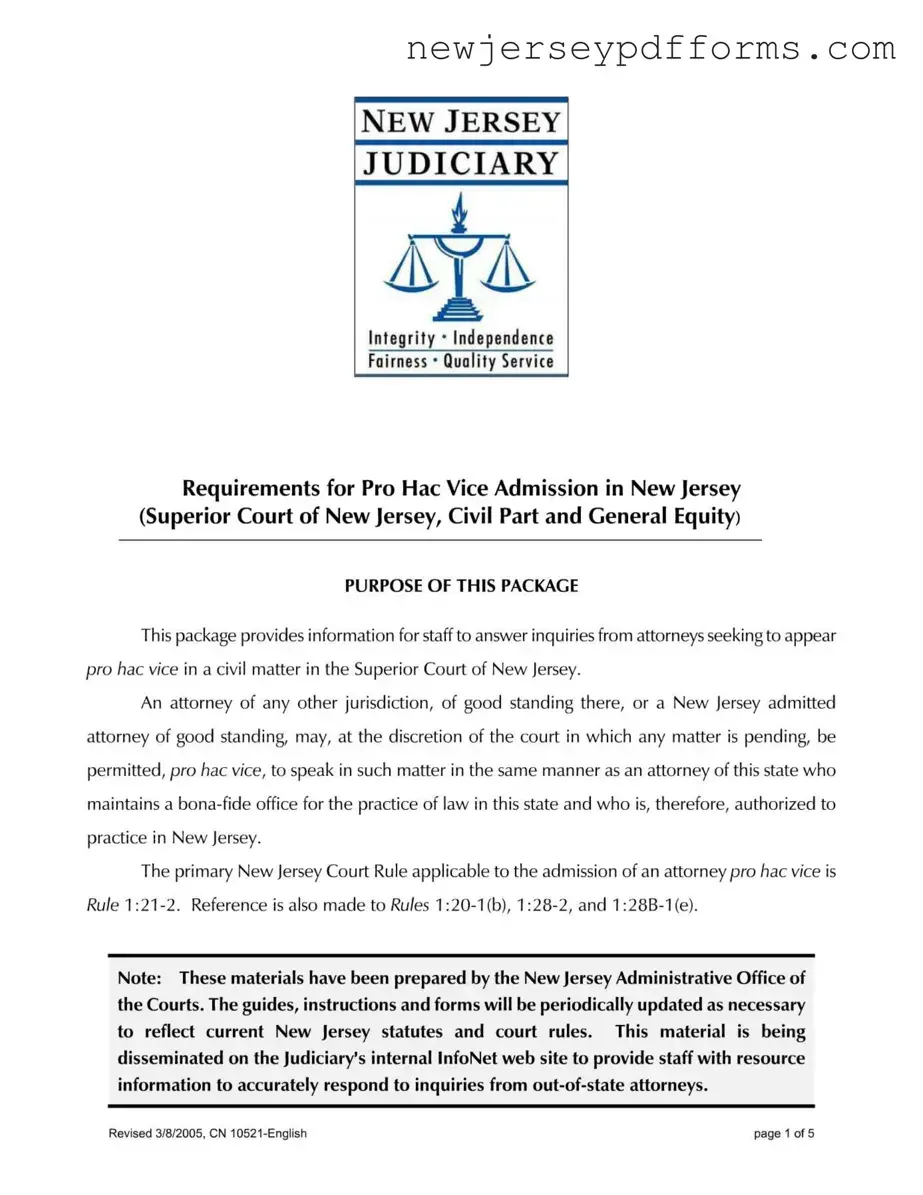The first document that is similar to the New Jersey Pro Hac Vice form is the Motion for Admission Pro Hac Vice used in many jurisdictions across the United States. This document serves the same purpose, allowing an out-of-state attorney to represent a client in a local court. It typically requires the attorney to demonstrate good standing in their home jurisdiction and to have local counsel associated with them. The motion often includes an affidavit or certification similar to that required in New Jersey, affirming the attorney's qualifications and the reasons for their admission.
Another comparable document is the Application for Admission Pro Hac Vice in California. This application also requires the out-of-state attorney to submit a form that includes their professional history, good standing status, and a declaration of local counsel. The California process emphasizes the need for the applicant to comply with local court rules and to maintain communication with the court regarding any disciplinary actions, mirroring the requirements in New Jersey.
The Texas Motion for Pro Hac Vice Admission is another document that shares similarities with the New Jersey Pro Hac Vice form. In Texas, the motion must be accompanied by a certificate of good standing from the attorney's home state and a statement confirming the attorney's association with a Texas-licensed attorney. This document, like its New Jersey counterpart, ensures that the court is informed of the attorney's qualifications and the rationale for their temporary admission.
In Florida, the Petition for Admission Pro Hac Vice is required for out-of-state attorneys wishing to represent clients in state courts. This petition necessitates the submission of a sworn statement detailing the attorney's qualifications and any disciplinary history. The process is designed to ensure that the attorney meets specific criteria before being granted permission to appear in court, similar to the New Jersey requirements.
The Illinois Motion for Leave to Appear Pro Hac Vice is yet another document that aligns with the New Jersey Pro Hac Vice form. This motion requires the attorney to provide proof of good standing in their jurisdiction and to have a local attorney sponsor their application. The Illinois court system emphasizes the importance of local representation, which is a common theme in pro hac vice admissions across various states.
If you're looking to organize your estate effectively, consider using the California Last Will and Testament document preparation guide. This form is pivotal in designating how your assets will be distributed after your passing, providing clarity and peace of mind for you and your family.
The New York Application for Admission Pro Hac Vice also parallels the New Jersey form. In New York, the application must include a detailed affidavit from the out-of-state attorney, confirming their good standing and outlining their qualifications. The requirement for local counsel to be involved is also a significant component, ensuring that the attorney complies with state laws and procedures.
In Massachusetts, the Motion for Admission Pro Hac Vice serves a similar function. This motion requires the out-of-state attorney to provide documentation of their good standing and to be associated with a Massachusetts attorney. The Massachusetts court system, like New Jersey, aims to maintain high standards for legal representation and to ensure that local rules are followed.
Finally, the Virginia Motion for Pro Hac Vice Admission mirrors the New Jersey process. This motion requires the out-of-state attorney to submit a certificate of good standing and to work alongside a Virginia-licensed attorney. The court reviews these applications carefully, similar to the New Jersey courts, to uphold the integrity and professionalism of legal practice within the state.

